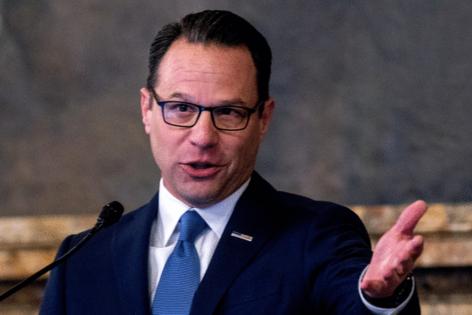Pa. Gov. Josh Shapiro and Republicans appear headed for energy showdown
Published in News & Features
HARRISBURG, Pa. — On a chilly day when Gov. Josh Shapiro stood before a cow-filled barn to promote the concept of farmer groups buying and running manure-to-energy devices — just one sliver of Shapiro's multifaceted energy plan — Pennsylvania state Sen. Gene Yaw sounded the energy alarm.
"We are going to have to suffer some hardships. Meaning, we probably are going to have some blackouts, brownouts," said Yaw, a Republican who has chaired the Senate Environmental Resources and Energy Committee for 12 years. "We are going to have times when the power that we need is not there."
Those statements, made Wednesday, highlight challenges facing Shapiro, a Democrat, and top Republican lawmakers as they try to figure out how to keep the lights on in Pennsylvania in future years. The urgency was underscored late Thursday when the state Public Utility Commission announced a public hearing set for next month on how electricity-hungry AI data centers and other big-consumption customers might affect the grid.
The fairness of potentially massive AI electrical consumption is a concern to Yaw. Proposals like the recent one to reopen the closed Three Mile Island Unit 1 nuclear plant just south of Harrisburg will do little to assure electricity for everyday Pennsylvanians, he said, since the juice will go to Microsoft and its AI ambitions.
"When it comes to electricity that we use as individuals, or in our homes, it really isn't helping," Yaw said.
Also not helping, Yaw said, is a situation in which Pennsylvania — one of the top electricity producers in the nation — is being asked to sponsor $160 million worth of high-voltage electrical lines solely to transmit electricity generated here to Maryland, which ranks near the bottom.
"Why should Pennsylvania ratepayers pay for a policy decision Maryland has made?" Yaw said.
Shapiro's appearance at the Blair County farm on Wednesday was the latest to promote his six-part "Lightning" proposal he describes as a comprehensive solution for Pennsylvania's energy future.
"I am an all-of-the-above energy governor. I am proud of the fact Pennsylvania is the second largest net energy exporter in the entire country," Shapiro said. "We have to generate more power. With more power comes more national security. More power means more independence. More power means more economic freedom."
Pennsylvania is part of PJM Interconnection, a regional transmission organization that coordinates movement of wholesale electricity in 13 states and the District of Columbia. A PJM spokesperson said increasing supply-demand issues are not unique to its service area but are playing out across the country.
Bills to carry out the various pieces of Shapiro's plan are being drafted.
One piece that will be introduced in the Senate by Berks County Democrat Judy Schwank would let groups of farmers band together to purchase and run "methane digesters" that promote decomposition of manure and in the process produce biogas — a renewable energy source. Another piece would revamp an existing state law that incentivizes energy efficiency measures like purchasing power-saving refrigerators or home heating systems.
The state Senate sponsor of that forthcoming bill, Democratic Sen. Lisa Boscola of Northampton County, said the existing law would be updated to cover things like smart thermostats, electrical panel upgrades and efficient roof designs.
Broader components of Shapiro's package include an overhaul of a economic development tax credit program that has not been used. Another would set up an energy project siting board. Still another would set up a Pennsylvania-only program meant to reduce carbon emissions and at the same time lower electricity bills for consumers.
Schwank said the overall solution is "not going to be one single source." Boscola said the state's wealth of energy sources makes her optimistic state leaders can figure it all out.
"If we do this right, you won't have blackouts," Boscola said. "And we shouldn't. We're an exporter."
Shapiro likely will have support in the House, which is controlled by Democrats. But Senate Republicans have cast doubt on his proposals.
They want him to drop any support for Pennsylvania participation in the Regional Greenhouse Gas Initiative, a multistate carbon-reduction program. Shapiro, widely acknowledged as a potential 2028 presidential candidate, fired back at the Republicans earlier this month and said his plan would take the place of being involved in RGGI.
"I have heard some people on the other side of the aisle who are in favor of literally doing nothing other than, you know, attacking me politically," he said. He added, "Here I am saying, 'Here's a better way forward that we can work on together, and if you want to get out of RGGI, come to the table and work on this with us.' Doing nothing is not an option."
Yaw agreed that action is needed, but he said Shapiro's plan doesn't get at the crucial, immediate need for reliable new, nonintermittent energy plants.
"We need to build this stuff, and we're not doing it," he said. Yaw said he has heard demand-supply problems may occur as soon as 2026-27, and "major problems" by 2028. At the same time, he said, it can take five to seven years to get a new power plant going.
"That's why I say, 'The numbers don't work anymore,'" Yaw said. "We're not going to make it."
_____
© 2025 the Pittsburgh Post-Gazette. Visit www.post-gazette.com. Distributed by Tribune Content Agency, LLC.







Comments